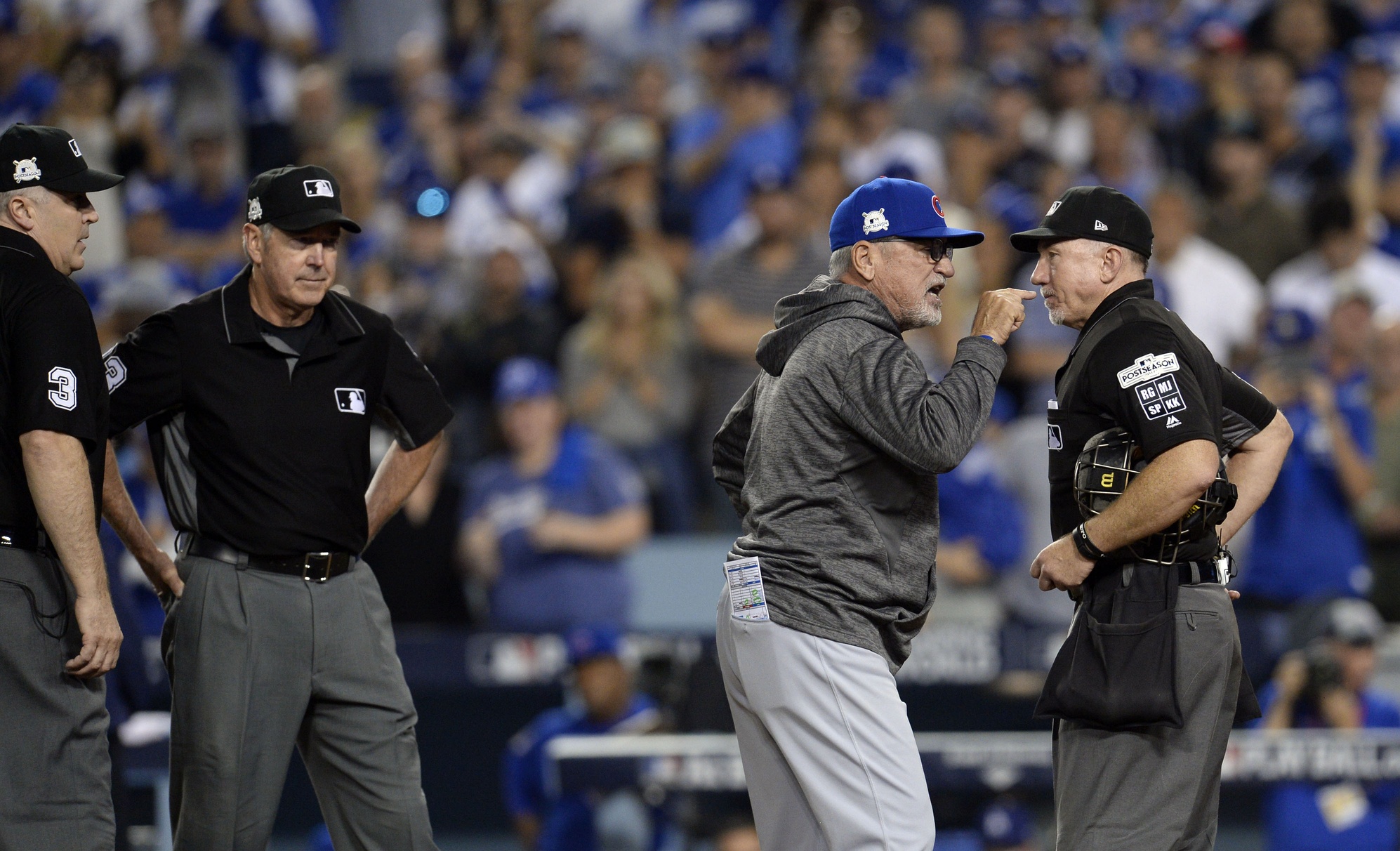If I would have told you that Clayton Kershaw wouldn’t see the sixth inning of tonight’s game, you would have been pleased. As it is, playoff baseball is… more complicated. Weird, even. And so when Kershaw exited immediately after the Dodgers tied the game at two, it was the inflection point of the game in an unexpected way.
How did we end up with such a seemingly favorable result? The Cubs had worked impressive at-bats versus Kershaw the entire game, laying off difficult pitches out of the zone and putting very solid contact on pitches catching too much of the plate. Never had Kershaw looked so eminently hittable—well, maybe in last year’s Game Six. By the fourth, Kershaw was all but sticking fingers in holes in the bursting dam. Willson Contreras lined a 3-1 pitch into center, and Albert Almora scorched a 90-mph cutter on the inside half of the plate into the left-field seats. Kershaw worked one more inning, quickly retiring the side but pushing his pitch count closer to rarified territory. Roberts would lift Kershaw for a pinch-hitter in the bottom of the fifth.
Into the bullpens: the Dodgers, well-rested and deep; the Cubs, exhausted and back-heavy. The move paid dividends for Dodgers managers Dave Roberts, as Tony Cingrani and Kenta Maeda made quick work of the middle of the Cubs order in the top of the sixth. Then, in the bottom of the sixth, as Héctor Rondón prepared to face his first live hitter in several weeks, the move paid dividends again. Chris Taylor, who launched a José Quintana pitch to the warning track in his previous at-bat, squared up Rondon’s second pitch and sent it over the wall in right-center field. 3-2 Dodgers.
The bold decision to pull Kershaw at that point in the game will loom large in the minds of those who watched, but the real crucial point in the game happened immediately prior to Roberts’s decision.
Quintana’s first four innings were impeccable. After a first inning in which he threw a few too many pitches despite sitting down all three Dodgers hitters, Quintana found his command, found his rhythm, and found an efficient pace. A minor threat in the form of a lone single to Logan Forsythe in the second succumbed to a slick 5-4-3 double play. Dodgers hitters failed to figure out Quintana’s mix of pitches and mix of locations, and Forsythe remained the only L.A. baserunner through four.
As the fifth started, the Cubs had to be feeling as good as one could feel in a Game One versus Kershaw. A seven-pitch strikeout of Kiké Hernández inflated Quintana’s pitch count to 67, and with Forsythe and Austin Barnes due up, Quintana had to be licking his chops. Unfortunately, the wheels came off. Quintana struggled to locate his fastball, walking Forsythe on five pitches. The left-hander pitched himself ahead of Barnes, to a 1-2 count, before losing his command for good and issuing the Dodgers’ catcher a free pass as well. With Yasiel Puig looming, the walks felt like Quintana’s death rattle.
Puig capitalized. His line drive double, smoked to left-center, plated Forsythe, and create-a-player shortstop Charlie Culberson added a sac fly to knot up the game. The Dodgers’ win probability had scraped 23 percent at the end of the fourth, but with Puig’s double, the Cubs were staring down a 53.8 percent Dodgers probability. A pair of home runs, from Taylor and Puig, gave the Dodgers a 4-2 lead.
The rest of the game hardly deserves comment. The Cubs couldn’t even tease a rally, couldn’t put runners in scoring position to make it interesting, couldn’t put pressure on Dodgers relievers. The questionable reversal of an out call at home plate in the seventh, the umpires offering a liberal interpretation of the collision rule, erased the Cubs’ most impressive athletic play on the night. The call hardly stung; the game already felt out of hand.
The Cubs cruised through four innings, hit road block in the fifth, and hobbled along the remainder of the game trying to find a rest stop. One thing sticks in my craw, though. Joe Maddon’s decision to yank Quintana after five would be sensible and defensible in most situations, as Quintana had labored in the fifth, clearly having lost his command. However, in a tie game, with Kershaw out, in a game that would have felt like a stolen win had they sealed it, Maddon chose to bring in his overtaxed bullpen. Wade Davis was likely not available. Carl Edwards, Jr., had three bad outings in the NLDS to two good ones. And, with Jon Lester pitching on short rest Sunday, the ‘pen needed to be somewhat rested. Ultimately, Maddon turned away from a struggling Quintana to a bullpen that had little chance of holding the game at two runs apiece.
Would Quintana have continued at the exhaustive pace he set in the fifth, eclipsing the 100-pitch mark and muddying his sparkling playoff numbers? Maybe. But, in a game that few expected the Cubs to win, with the deck stacked so heavily against them—they had to at least try, didn’t they?
Lead photo courtesy Gary A. Vasquez—USA Today Sports

i agree. we needed more innings out of Quintana, and i felt that he could have given it. could be wrong, but would have done worse than our bullpen did?